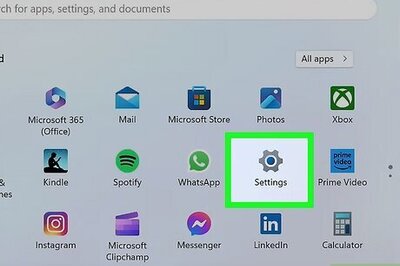
views
New Delhi: Even as JNU students Kanhaiya Kumar and Umar Khalid have been named as main accused in 2016 sedition case, there were 36 others, including student activist Shehla Rashid, against whom sufficient evidence has not been found.
These participants were involved in organising the event and some were even spotted carrying posters of Afzal Guru, but were not found to be supporting "anti-national" occurrence on the day.
The chargesheet, which contains mobile footage as visual evidence against Kumar, Khalid and Anirban Bhattacharya, shows participants like Rama Naga and Anant Prakash Narayn raising slogans, but not the anti-national ones.
Similarly, Komal Mohite and Aswathi Nair were mentioned as organisers in the posters that invited people to protest against the hanging of Parliament attack mastermind Afzal Guru, but were not seen as active participants of the 'seditious' event on February 9, 2016. Aishwarya Adhikari was seen walking around with Afzal Guru's poster but didn't raise any anti-national slogans.
Another JNU student Banojyotsana Lahir went to attend the programme after seeing the poster on social media, but footage does not show him raising the controversial slogans.
Such members have been mentioned in column 12 of the chargesheet, which includes names of people against whom sufficient evidence have not been found.
Among others who find mention in this column are Shehla Rashid, former vice president JNUSU , Mohit Pandey former president JNUSU, D Raja's daughter Aprajita along with Anjali Kumari, Ameesha Chakraborty, Bhawna Bedi, Rubina Saife, Samar Khan, Reyazul Haque, Chinmaya Mahanand, Avantika Das, Shivani, Gargi Adhikari, Aparn , N Sai Balaji, Dr Srirupa Bhattacharya, Shashi Tripathi, P Surjana Yadav, Chepal Sherpa, Satarupa, Y Uday Kumar , Bhupali V Nagare, Sarbani Chakraborty, Ishan Anand, G Suresh, Chintu Kumari, Aman Sinha, Ashutosh Kumar and Kaushik Raj.
The Delhi Police has submitted eight footages of the incident as the electronic evidence in the court along with the witness account. The electronic footages are mostly the footages seized during investigations and have been found genuine by the forensic lab.
The Delhi Police maintained that their investigation is thorough and that the delay in the chargesheet was due to the delay in receiving forensic report. The Delhi Police commissioner, Amulya Patnaik, at the annual press conference of Delhi Police, had said that the investigation also involved officers visiting several states for evidence and recording of statements.
Kanhaiya has been charged IPC sections 124A (sedition), 323 (Punishment for voluntarily causing hurt), 143 (punishment), 147 (rioting), 149 (unlawful assembly), 120B (criminal conspiracy).
According to police, Kanhaiya has been identified by witnesses in the videos. There are videos footages wherein he is seen leading the students, who were raising anti-national slogans. “The SMS sent by Umar Khalid to Kanhaiya to arrive at Sabarmati Dhaba, JNU, as their permission has been cancelled by the JNU administration,” has also been included in the electronic evidence that has been submitted in the court along with the mobile phone location of Kanhaiya at the time of the incident.
The administrative action taken by the chief proctor of JNU suspending Kanhaiya for his role in the event has been produced as the documentary evidence by the police.
Another accused Umar Khalid has been charged under IPC sections 124A (sedition), 323 (Punishment for voluntarily causing hurt), 143 (punishment), 147 (rioting), 149 (unlawful assembly), 120B (criminal conspiracy), 465 (punishment for forgery), 471 (Using as genuine a forged document).
Police have presented electronic evidences where Khalid is “being seen raising and supporting anti-National slogans". His name emerged as the organiser of the event on Afzal Guru, which created the entire controversy. He has also been accused of forging the signatures of Ashwathi and Anirban on original permission letter of the event.
The cops have presented his mobile phone locations, the pamphlet of the event which was retrieved from his email, and CDR proving him being in touch with other accused in the case. Police have also recorded “statements regarding the anti-national slogan raised / supported by him.”
Third accused Anirban Bhattacharya has been booked under IPC sections 124A (sedition), 323 (Punishment for voluntarily causing hurt), 143 (punishment), 147 (rioting), 149 (unlawful assembly), 120B (criminal conspiracy). Police claim that the video footages that they receive have him “raising and supporting” anti-national slogans that took place in the event where his name is also mentioned as the organiser on the pamphlet of Afzal Guru. Cops have also recovered original performa for booking the venue inside JNU which his name and signature.
Kanhaiya, Khalid and Anirban were arrested by the Delhi Police and later released on bail. The rest seven accused — Aqueeb Husain, Basharat Ali, Mujeeb Hussain Gattoo, Umair Gul, Muneeb Hussain Gattoo, Rayees Rasool, Khalid Bashir Bhatt — have not been arrested by the Delhi Police but police claims to have enough evidence against them as well.
While Aqueeb, a student from outside JNU, has been identified in the videos by the professor, where he was studying Basharat has been identified by the witnesses in the video. “The video footages wherein they are seen raising and supporting anti-national slogans and their mobile phone locations showing them present inside the JNU campus during the time of incident.” Are the electronic evidences that the police have presented against them. The cops have kept oral evidence and documentary evidences column, against their name, blank.
Similar evidences have been produced against Mujeeb, Umair, Muneeb, Rayees and Khalid Bashir Bhatt.




















Comments
0 comment